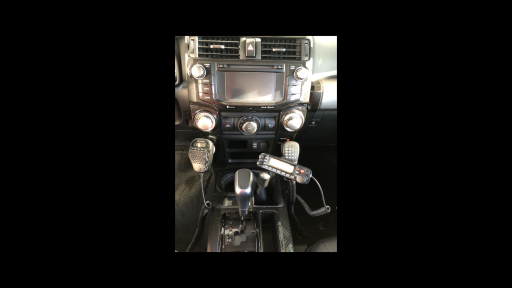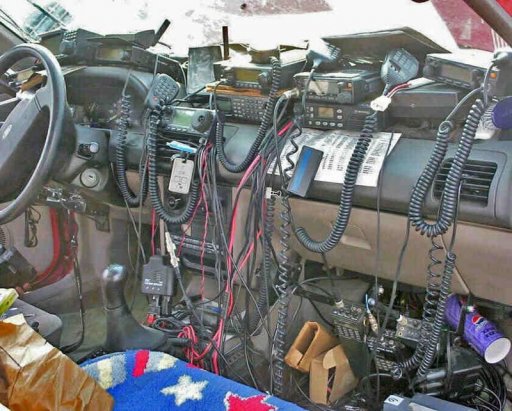This is me. I’ve been a CB guy since 1990, primarily because that was what was available. Affordable handheld radios pretty much sucked and a vehicle mounted radio wasn’t cheap. Plus no one else was using them because everyone had a CB. There are one or two guys I’ll go off-roading or camping with and they have CBs too. The limited range isn’t an issue because we are not communicating over long distances. We just need to be able to talk to the vehicle a couple hundred yards away about turning there or stopping here.
So, for about $100, you can install a pretty good CB radio setup that gives you a communication option that may not get much use at all on the trail, assuming the other vehicles are equipped. You can also pick up a handheld CB for less than $50 that you can “loan” to a friend on the trail if they aren’t equipped. But a CB certainly can be useful on the road. Especially for getting road conditions and accident updates from all the truckers who still use CBs.
Unless your involved with a group that has a dedicated comm setup or you personally have an interest in developing your own, a CB is tried and true for the purpose it was designed, is easy to use and still very common among my circle.
CB's were all the rage for a period of time, that's for sure. And it sounds like yours works for your application which is great. That's what it's all about. I will suggest a counterpoint though for new folks reading this thread and wanting to compare the two (it's not meant as a critique...you could be using tin cans on a string between cars and if that works for your crew, that is a) hilarious and b) totally and completely your choice and a great solution so don't change a thing!)
I would suggest for a person who has yet to adopt a system that GMRS can do everything a CB can, but for less money, and better.
CBs have a lot of the hiccups of HAM in some ways -- you need to set them up properly tune the radio to the antenna (which requires a special meter), and even when it's perfectly dialled in you'll be looking at maybe a 2-5 mile range. That works perfectly well for most folks and I'd say if you and your community are already set up on CBs for overloading, there's no need to switch. But if you are starting fresh, take a look at what GMRS can do for you.
- GMRS Radios are cheap. You can get a two pack for $50 or less which equips you and your buddy. (for example,
https://www.walmart.com/ip/Midland-LXT600VP3-26-mile-Range-2-way/20532050). More expensive options top out at around $75, and include features like Bluetooth (Great for motorcyclist overlanders with a range of headset brands as these allow Sena, Cardo, Scala, etc. to all work together!) and waterproofing as well as a bit better TX power and RX sensitivity (TX = transmit; RX = recieve). Places like Costco sell 2 packs of
very good radios for fairly low prices.
- GMRS Radios have a comparable range to a typical CB setup, in that they handle local communications out to a couple of miles just fine even if rough terrain.
- GMRS usually has a clearer audio quality than CB (by account of the frequencies they operate on)
- GMRS units can be purchased in base station configurations (See the Midland options posted earlier) that put out up to 40 watts of power and can use repeaters. CBs are limited to 4 watts (I think) and cannot use repeaters.
- If you get a surprise friend joining you on a trip, you can usually pick up a GMRS radio at a gas station these days to add them to the comms link.
- GMRS often will have a multitude of privacy codes which will allow your group to chat privately even if there are 20 other people using that channel.
- GMRS is, like CB, a license free service
in Canada. Others have posted that you need a $70 family license (good for 10 years) in the USA.
- GMRS radios comes in purdy colours, like pink, yellow, and camo, if that's your thing :D (I'm running out of advantages for my list!)
Anyway that's my take on it. CB is still really useful in some contexts -- my understanding is its still the 'radio of choice' for truckers so on interstate travel it potentially still handy.
And actually, another argument for HAM over GMRS or CB is that a lot of haul roads up here in Canada have a frequency posted at the start of the road of the commercial channels being used. These are usually just lower than HAM frequencies and are specific to commercial radios. But, companies like and typically encourage amateurs using the haul roads to tune into those channels. Some even encourage you to transmit. The way the radio is used is you call out your kilometre marker and whether you are 'heavy' (coming out of the bush) or 'Light' (going into the bush). This means there are fewer surprised of a fully loaded B-train logging truck careening around a mountain road into a camper's minivan. If all you do is listen it'll let you know when a truck is heading your way and can help you be a bit more cautious and maybe pull over.
Yikes...I think the moral of the story after all this typing is install a dual battery and heavy duty alternator, make your rig look like a porcupine with antennas, and get one of ALL the radios. That way you're set no matter what :D (Kidding!)









